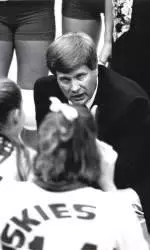Former Coach Bill Neville Now A Hall Of Famer

June 15, 2012
SEATTLE - Former Washington women's volleyball coach Bill Neville has been given one of the highest honors in his profession, as he is one of the selections for the American Volleyball Coaches Association (AVCA) 2012 Hall of Fame class. Neville was the sixth coach in Washington history, taking over the team during the 1991 season and coaching through the 2000 campaign.
The tenth annual AVCA Hall of Fame class features Neville, Arnie Ball, Carol Russo and Rudy Suwara. They will be inducted in ceremonies December 13, 2012 at the Jostens Coaches Honors Luncheon, held in conjunction with the 2012 AVCA Annual Convention in Louisville, Kentucky.
"Bill is one of the founding fathers of our sport," said current Husky Head Coach Jim McLaughlin. "He's part of a foundation with men like Doug Beal, Marv Dunphy, Jim Coleman and Carl McGown. They created the philosophy of the United States, and Bill is a huge part of that. It's an honor to have one of our former coaches become a Hall of Fame member. He's done a lot for volleyball nationwide."
Over the past four decades, there is little Bill Neville hasn't done in the volleyball arena. Starting his career in 1967 as the head coach of the All-Army Volleyball Team, Neville established himself as one of the top coaches in the domestic and international game.
In the 1968 Olympic Games held in Mexico City, he served as the U.S. Men's Assistant Coach before becoming the temporary head coach of the Women's National Team in the 1972 Olympics. After the short stint he went north of the border that year to be the Canadian National Team's Head Coach, making him not only the first full-time coach the Canadian program has seen, but the youngest to serve as an Olympics Head Coach of any sport at the time.
He then stepped away from the international scene after his second Olympics to become the head coach at Montana State University. However, he couldn't resist the lure of the National Team once again joining the men as the assistant coach. When he first took over the program it was ranked 19th in the world, but by the end of the 1984 Olympics the squad finished with their first-ever gold being revered as one of the best teams of all time.
Neville went on to share the next six years coaching Montana State and the U.S. Men's National Team while also serving as a USA Volleyball Technical Director for two years. As technical director he developed the organization's Coaching Accreditation Program, or CAP, which is still in use today.
In 1991, he was hired to be the new head coach at the University of Washington. While at the helm of the Huskies, Neville led Washington to three NCAA Tournament appearances including a trip to the round of 16 in 1997. He earned the Pac-10 Coach of the Year in 1996 as the Huskies went 23-8 and advanced to the NCAA second round. His Husky teams combined for a 135-131 record.
Neville coached Husky All-Americans Angela Bransom and Makare Desilets, as well as Paige Benjamin who would earn All-America First Team honors for Coach McLaughlin in 2002. Neville also coached current Husky associate Head Coach Leslie (Tuiasosopo) Gabriel throughout her playing days from 1995-98.
"I am really excited for him, he definitely deserves this honor," said Gabriel. "I remember him as a very passionate coach who loved to win but also just loved the game of volleyball. He was always in his office huddled over papers or his coaching book, trying to write the greatest practice. He always knew what buttons to push to get the intensity in the gym, and as I entered into the profession, his passion for the game and for the players was something that I tried to apply. I know he's done a lot for the game nationally and in our community."
He currently serves as the National Commissioner of Coaches Education, holding that position since 2003. He has parlayed his incredible knowledge of training into three books and has produced numerous instructional articles and videos. Through his company Nevillizms Inc., he continues to study and develop new and effective approaches to training and competing based on the rule modifications and trends in the game.
Information from the AVCA contributed to this story.







